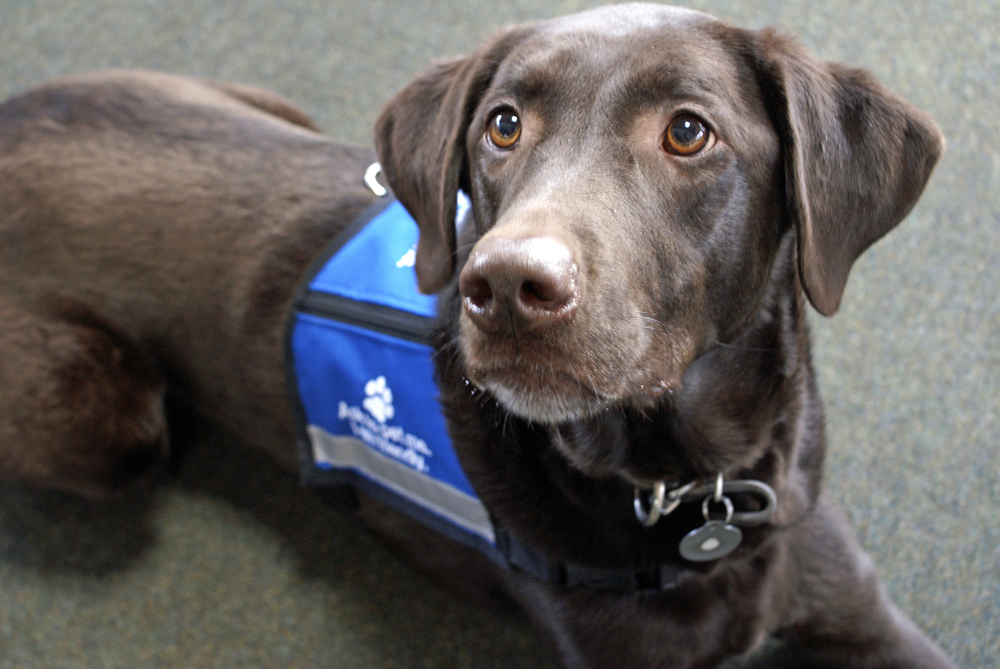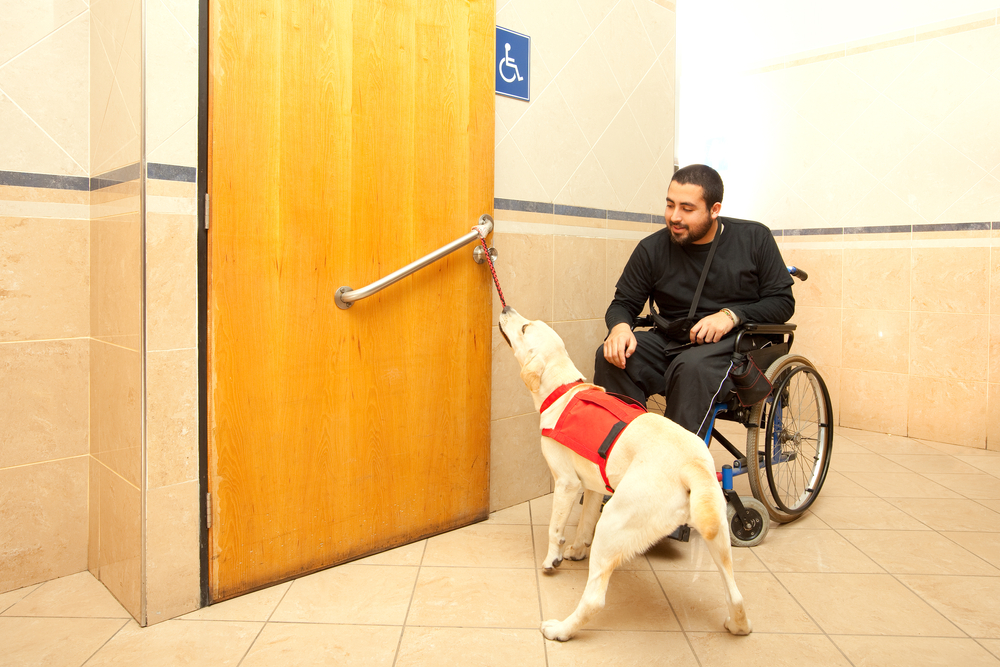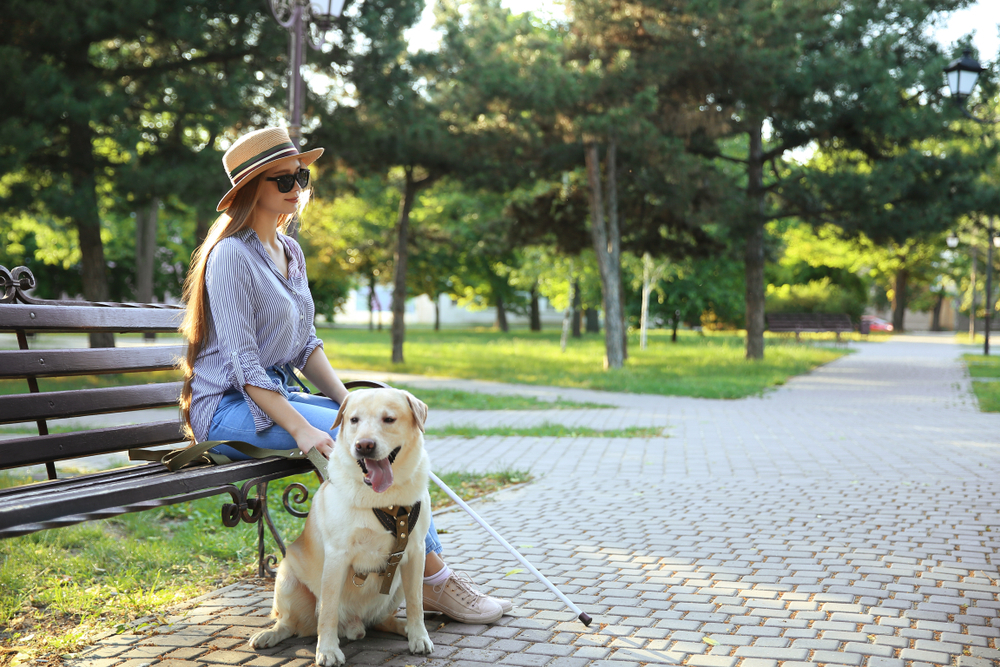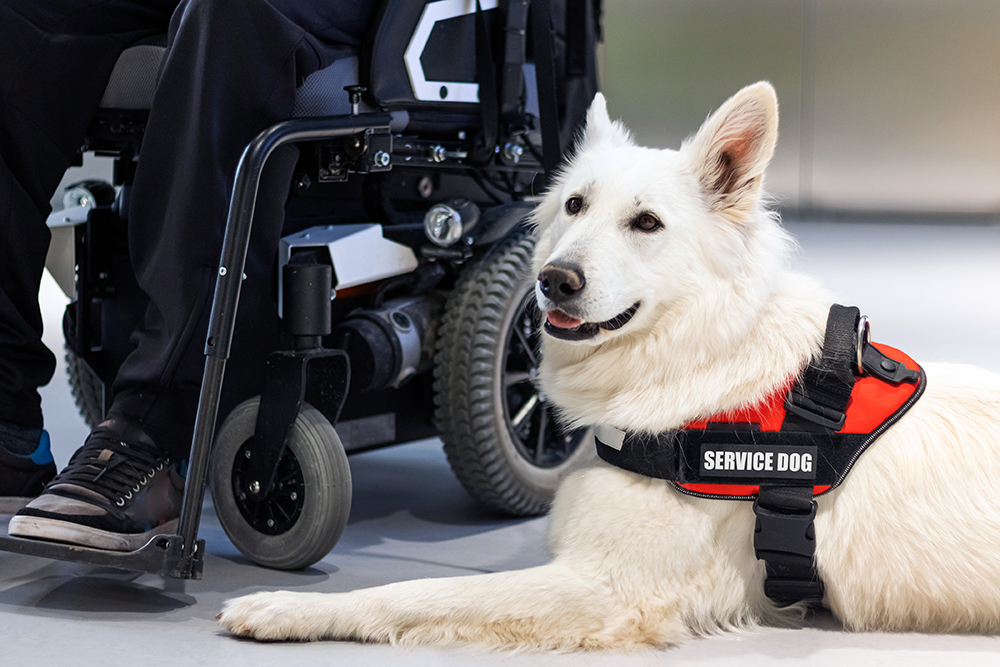You’ve probably seen people with service dogs before while out and about. You might have noticed that some service dogs wear vests, but others do not. But don’t all service dogs have to wear a vest?
Actually, no, they do not! It’s a common misconception that all service dogs must wear a vest while they are out and performing their duties, but this isn’t true. So, what is required of a service dog, and what are some other common misconceptions?

Do Service Dogs Have to Wear a Vest?
The Americans With Disabilities Act (ADA) lays out the rules that apply to service dogs, such as where they’re allowed to go, what people are allowed to ask a person about their service dog, and so forth. The ADA clearly states that animals are not required to wear a vest or have any other identification indicating they are a service dog.
However, many people choose to outfit their service dogs with vests to let the people they come into contact with know the dog is a service animal. This can help discourage others from petting the service dog or otherwise distracting the canine from their duties. A vest is also a clear way to let those running public establishments know that the dog is allowed to be in that establishment.


5 Other Common Misconceptions People Have About Service Dogs
People have many other common misconceptions about what is required of service dogs. Here are just a few.
1. Service Dogs Are Only Allowed for Those Who Are Seeing or Hearing Impaired
When they hear the word “service dog,” many people picture guide dogs for those who are seeing or hearing impaired. However, service dogs can be used to support people with a wide variety of physical and mental health conditions. Just a few conditions that can benefit from service dogs include PTSD, sleep apnea, epilepsy, multiple sclerosis, diabetes, anxiety, autism, Parkinson’s disease, and depression.
2. Service Dogs Are Registered
Another common misconception is that all service dogs are registered with the government, which is untrue. There is no official database of service dogs and no paperwork on them. In fact, establishments and businesses are not allowed to ask a person for documentation proving that a dog is a service dog. Honestly, the service animal system is kind of an honor system.

3. Service Dogs Must Be Officially Trained
While some service dogs go through official training programs that begin in puppyhood, there is no requirement that a dog be trained through an official program. These programs are often costly, so not everyone can afford to get a service dog who has been officially trained or send their dog to one of these programs. As such, many people will train their dogs themselves or choose another less expensive option.
4. People Can Only Have a Single Service Dog
The majority of people with service dogs will only have a single one, but they aren’t limited to having just one. People can have multiple service dogs if needed, and there is sometimes a need. For example, a person might have a psychiatric service dog who reminds them when to take their medication and a different service dog to help provide stability as they move around because they have issues with mobility. So, individuals are not limited to just one service dog!

5. Not All Dog Breeds Can Be Service Dogs
When you think of service dogs, you probably picture Golden Retrievers, Labradors, Huskies, or German Shepherds. You may also think that some dog breeds aren’t allowed to be service dogs. But this is untrue in the United States. Some states have breed-specific restrictions or bans, however, even if a dog breed is banned, a service dog may be any breed. In fact, service dogs can’t be excluded from locations because of a general fear of the breed. They can be excluded from locations and establishments if they are a direct threat to the health and safety of others or if they aren’t being controlled by their owner, though.

What Is Required of Service Dogs?
What exactly is required for a dog to be a service animal? Well, service animals can only be canines, for starters. They must also be trained to perform a specific task (or tasks) for someone with a disability. That’s all that is required for a dog to be a service animal.
Fake Service Dogs
Because service dogs have become more recognized, fake service dogs have become a thing. Essentially, people simply take their dog out somewhere and claim it’s a service animal. There’s even a market for things like vests, IDs, and counterfeit certifications.
Why would people do this? In most cases, people just want to bring their dogs with them wherever they go. In other cases, the person wants to live somewhere with their pup that has a “no animals” rule. And in some cases, people want to travel with their canine companions without having to pay extra fees to do so. Occasionally, people also mistakenly believe that their emotional support animal (ESA) is a service dog, but these are two separate things, and ESAs don’t have the rights that service animals do.
Fake service dogs may seem like they’re not doing much harm, but they truly are. Their most significant impact is on people with disabilities who legitimately require a service dog, as fake service dogs don’t have the training a real one does. If these dogs misbehave in public spaces, there is more scrutiny and distrust for service dogs, in general, which makes the lives of people using real service dogs more difficult.


Final Thoughts
Service dogs aren’t required to wear vests or otherwise have identification indicating they are service animals. In fact, not much is required for service dogs at all. They must simply be dogs trained to perform specific tasks for someone with a disability. As such, there has been a surge in fake service animals, which is unfortunate for those utilizing real service dogs.
Featured Image Credit: 24K Production, Shutterstock
